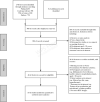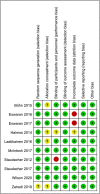A Low-FODMAP Diet Improves the Global Symptoms and Bowel Habits of Adult IBS Patients: A Systematic Review and Meta-Analysis
- PMID: 34490319
- PMCID: PMC8417072
- DOI: 10.3389/fnut.2021.683191
A Low-FODMAP Diet Improves the Global Symptoms and Bowel Habits of Adult IBS Patients: A Systematic Review and Meta-Analysis
Abstract
Background: A low-fermentable oligo-, di-, monosaccharides, and polyols (FODMAP) diet has been reported to be associated with improving the symptoms of irritable bowel syndrome (IBS); however, its efficacy as evaluated by different studies remains controversial. Objective: A systematic review and meta-analysis of randomized controlled trials (RCTs) were conducted to explore the efficacy of a low-FODMAP diet (LFD) in alleviating the symptoms of IBS. Methods: A search of the literature for RCTs that assessed the efficacy of an LFD in treating IBS patients was conducted using the electronic databases PubMed, Embase, Cochrane Central Register of Controlled Trials, and Web of Science. The searches in each database were conducted from the inception of the database to February 2021. Two independent reviewers screened citations and a third reviewer resolved disagreements. Two independent reviewers also performed eligibility assessments and data extraction. The RCTs that evaluated LFDs vs. a normal IBS or usual diet and assessed changes of IBS symptoms were included in the search. Data were synthesized as the relative risk of global symptoms improvement, mean difference of IBS Severity Scoring System (IBS-SSS) score, sub-items of IBS-SSS irritable bowel syndrome-related quality of life (IBS-QOL), hospital anxiety and depression scale (HADS), stool consistency/frequency, and body mass index (BMI) using a random effects model. The risk of bias was assessed using Risk of Bias Tool 2 (RoB 2). The bias of publication was assessed based on Egger's regression analysis. The quality of evidence was assessed using the Grading of Recommendations Assessment, Development and Evaluation (GRADE) methodology. Results: A total of 2,768 citations were identified. After full-text screening, a total of 10 studies were eligible for the systematic review and were subsequently used to compare an LFD with various control interventions in 511 participants. An LFD was associated with the improvement of global symptoms [n = 420; Risk Ratio (RR) = 1.54; 95% Confidence Interval (CI) 1.18 to 2; I 2 = 38%], improvement of stool consistency [n = 434; Mean difference (MD) = -0.25; 95% CI -0.44 to -0.06; I 2= 19%), and a reduction trend of stool frequency (n = 434; MD = -0.28; 95% CI -0.57 to 0.01; I 2 = 68%) compared with control interventions. There was no statistically significant change in IBS-QOL (n = 484; MD = 2.77; 95% CI -2 to 7.55; I 2 = 62%), anxiety score (n = 150; MD = -0.45; 95% CI -3.38 to 2.49; I 2 = 86%), depression score (n = 150; MD = -0.05; 95% CI -2.5 to 2.4; I 2 = 88%), and BMI (n = 110; MD = -0.22; 95% CI -1.89 to 1.45; I 2 = 14%). The overall quality of the data was "moderate" for "global improvement of IBS symptom," "stool consistency," "stool consistency for IBS with diarrhea (IBS-D)," and "stool frequency for IBS-D," and "low" or "very low" for other outcomes according to GRADE criteria. Conclusion: An LFD is effective in reducing the global symptoms and improving the bowel habits of adult IBS patients. The efficacy for IBS-D patients can also be more pronounced. Systematic Review Registration: CRD42021235843.
Keywords: FODMAP; HADS; diet; irritable bowel syndrome; meta-analysis; quality of life.
Copyright © 2021 Wang, Yang, Zhang and Hou.
Conflict of interest statement
The authors declare that the research was conducted in the absence of any commercial or financial relationships that could be construed as a potential conflict of interest.
Figures










References
Publication types
LinkOut - more resources
Full Text Sources

